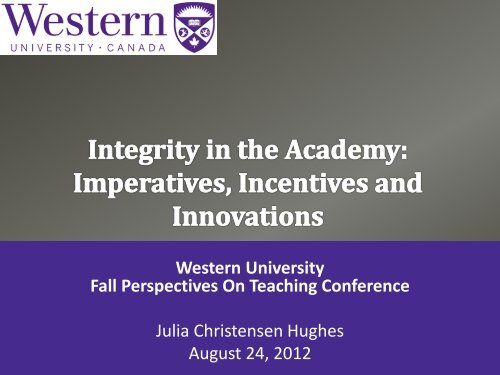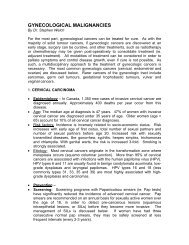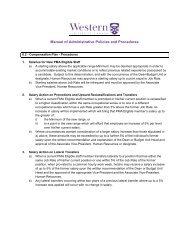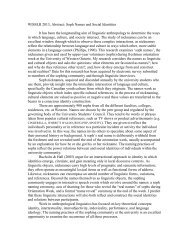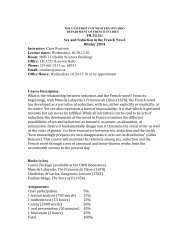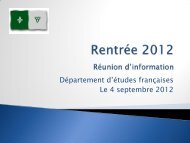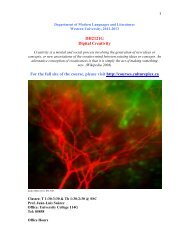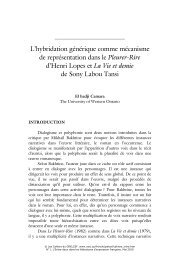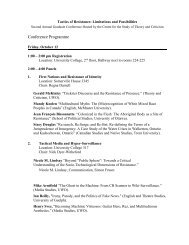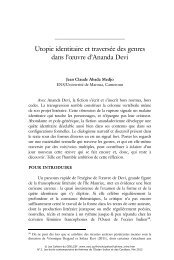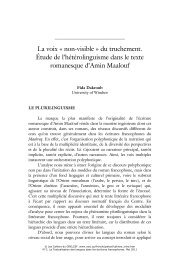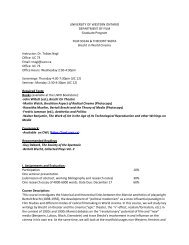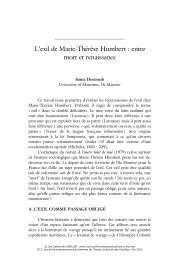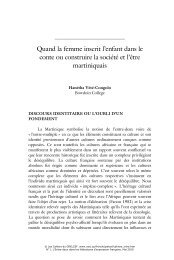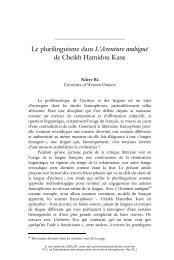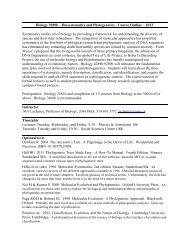Integrity in the Academy - University of Western Ontario
Integrity in the Academy - University of Western Ontario
Integrity in the Academy - University of Western Ontario
You also want an ePaper? Increase the reach of your titles
YUMPU automatically turns print PDFs into web optimized ePapers that Google loves.
<strong>Western</strong> <strong>University</strong><br />
Fall Perspectives On Teach<strong>in</strong>g Conference<br />
Julia Christensen Hughes<br />
August 24, 2012
What is academic <strong>in</strong>tegrity?
Firm adherence to a code <strong>of</strong> especially moral or<br />
artistic values: <strong>in</strong>corruptibility<br />
Synonym: honesty<br />
(Merriam Webster, on-l<strong>in</strong>e)<br />
“A commitment, even <strong>in</strong> <strong>the</strong> face <strong>of</strong> adversity, to five<br />
fundamental values: honesty, trust, fairness, respect,<br />
and responsibility” (CAI, Clemson <strong>University</strong>)
Intentional wrongdo<strong>in</strong>g; specifically: deliberate<br />
violation <strong>of</strong> a law or standard <strong>of</strong> practice especially<br />
by a government <strong>of</strong>ficial<br />
Synonym: misbehaviour<br />
(Merriam Webster, on-l<strong>in</strong>e)<br />
“Anyth<strong>in</strong>g that gives a student an unearned<br />
advantage over ano<strong>the</strong>r.”<br />
<strong>University</strong> Affairs, Mullens (2000, p. 23)
Not just about “catch<strong>in</strong>g” students<br />
Creat<strong>in</strong>g a culture/environment <strong>in</strong> which all<br />
members <strong>of</strong> <strong>the</strong> community are committed to<br />
– and held accountable for - uphold<strong>in</strong>g shared<br />
values
Our Mission Statements:<br />
Education <strong>of</strong> students<br />
Conferr<strong>in</strong>g <strong>of</strong> degrees<br />
Pursuit <strong>of</strong> truth or knowledge
“academic excellence”<br />
“create an environment <strong>in</strong> which students are grounded <strong>in</strong> <strong>the</strong><br />
values and responsibilities <strong>of</strong> <strong>the</strong> scholarly life”<br />
“highest ideals <strong>of</strong> scholarly responsibility”<br />
“we are accountable to our students and <strong>the</strong> general public<br />
for <strong>the</strong> quality <strong>of</strong> our teach<strong>in</strong>g, research and service”<br />
(Strategic Plan, 2006)
“Universities are perceived as epitomiz<strong>in</strong>g<br />
<strong>in</strong>tellectual and social honesty, and <strong>the</strong>y are<br />
expected to strive cont<strong>in</strong>ually for that form <strong>of</strong><br />
perfection” (Besv<strong>in</strong>ick, 1983, p. 569).
“Wise societies s<strong>in</strong>ce <strong>the</strong> time <strong>of</strong><br />
Plato…have educated for<br />
character as well as <strong>in</strong>tellect,<br />
decency as well as literacy, virtue<br />
as well as knowledge.” (p. 6)<br />
Theodore Roosevelt<br />
“To educate a person <strong>in</strong> m<strong>in</strong>d and not<br />
<strong>in</strong> morals is to educate a menace to<br />
society.” (p. 3)
Academic misconduct is commonplace<br />
“The mystery is not why cheat<strong>in</strong>g is wrong or<br />
why students cheat, but why <strong>the</strong>re is so little<br />
passion about this massive assault on <strong>the</strong><br />
highest values <strong>of</strong> <strong>the</strong> academy.”<br />
(Alschuler & Bliml<strong>in</strong>g, 1995, p. 124)
11 Universities 2002 – 2003<br />
14,913 undergraduate students<br />
1,269 1 st year – high school<br />
1,318 graduate students<br />
683 TAs, and 1,902 faculty<br />
Canadian Journal <strong>of</strong> Higher Education, v36 n1 p49-63 2006<br />
Canadian Journal <strong>of</strong> Higher Education, v36 n2 p1-21 2006
Self-reported<br />
Wide range <strong>of</strong> response rates/populations<br />
Student concern with confidentiality<br />
Not prescriptive or conclusive
Work with o<strong>the</strong>rs<br />
Get Q&A <strong>in</strong> advance<br />
Copy a few sentences<br />
Fabricate/falsify lab data<br />
Copy<strong>in</strong>g dur<strong>in</strong>g exam<br />
Fabricate/falsify a bibliography<br />
Fabricate/falsify research data<br />
Turn <strong>in</strong> work by someone else<br />
Buy paper <strong>of</strong>f Internet
Work with o<strong>the</strong>rs (76%, 45%, 29%)<br />
Get Q&A <strong>in</strong> advance (73%, 38%, 16%)<br />
Copy a few sentences (62%, 37%, 24%)<br />
Fabricate/falsify lab data (50%, 25%, 6%)<br />
Copy<strong>in</strong>g dur<strong>in</strong>g exam (33%, 6%, 3%)<br />
Fabricate/falsify a bibliography (30%, 17%, 9%)<br />
Fabricate/falsify research data (29%, 9%, 3%)<br />
Turn <strong>in</strong> work by someone else (22%, 9%, 4%)<br />
Buy paper <strong>of</strong>f <strong>in</strong>ternet (1%, 1%, 0%)
Pal Schmidt, President <strong>of</strong> Hungary<br />
1992 doctoral dissertation<br />
>200/215 pages plagiarised<br />
stripped <strong>of</strong> doctorate, resigned presidency<br />
BBC News, March 29 2012<br />
CNN World, April 2 2012
Athabasca <strong>University</strong><br />
5/13 pages communications<br />
course<br />
“relatively m<strong>in</strong>or error”<br />
http://www.huff<strong>in</strong>gtonpost.ca/2011/06/17/philipbaker-dean-alberta_n_879230.html<br />
http://www.youtube.com/w<br />
atch?v=Yb4MIH7jgaQ
1. Risk perception<br />
2. Policies and practices<br />
3. Quality <strong>of</strong> teach<strong>in</strong>g and assessment
Even when people are caught cheat<strong>in</strong>g dur<strong>in</strong>g a test or<br />
exam<strong>in</strong>ation, <strong>the</strong>y are <strong>of</strong>ten just told to stop. The<br />
measures that are supposed to be taken are not<br />
taken. I th<strong>in</strong>k this leads to <strong>the</strong> attitude some people<br />
take that cheat<strong>in</strong>g is not a big deal.
Cheat<strong>in</strong>g seems most <strong>of</strong>ten to be required <strong>in</strong><br />
order to physically complete <strong>the</strong> workload<br />
expected <strong>of</strong> students. I hate cheat<strong>in</strong>g, it feels<br />
horrible, but I wouldn’t have passed or made<br />
it this far without it.
As long as universities are not about learn<strong>in</strong>g,<br />
students will cheat…Are assignments given to<br />
teach <strong>the</strong> students <strong>the</strong> material, or are<br />
assignments given to determ<strong>in</strong>e what <strong>the</strong><br />
student will get as a mark? There is only one<br />
primary purpose. ‘Cheat<strong>in</strong>g’ allows <strong>the</strong><br />
student to get a better mark.
Students cheat when <strong>the</strong>y feel cheated<br />
If universities create ‘game play<strong>in</strong>g conditions’,<br />
some students will engage <strong>in</strong> ‘game play<strong>in</strong>g<br />
behaviours’
1. Recommit to <strong>in</strong>tegrity as a core value<br />
2. Provide quality education<br />
3. Reform assessment practice<br />
4. Review, revise and clarify policies and<br />
procedures<br />
5. Provide educational/orientation activities
Innovations<br />
o Academic <strong>Integrity</strong> Officers<br />
o Revisited policies and procedures<br />
• Ambassadors and ombudspeople<br />
o Educational activities<br />
• Innovative poster campaigns<br />
o S<strong>of</strong>tware
Adm<strong>in</strong>istrators<br />
Researchers
Philip Baker, Dean <strong>of</strong> Medic<strong>in</strong>e (June, 2011)<br />
"There's several parts where he talks about one <strong>of</strong> his children becom<strong>in</strong>g ill,<br />
his wife hav<strong>in</strong>g medical problems, he describes a patient that he had —<br />
which is not a patient that he had — and it's a very personal story … and it<br />
was a very good story, it's just <strong>the</strong> th<strong>in</strong>gs that happened <strong>in</strong> <strong>the</strong> story didn't<br />
happen to him.” http://www.cbc.ca/news/canada/edmonton/story/2011/06/12/edm-university-alberta-speech.html
“behaviours that distort scientific knowledge”<br />
– fabrication, falsification, “cook<strong>in</strong>g” <strong>of</strong> data<br />
Fanelli D. How Many Scientists Fabricate and Falsify Research? A<br />
Systematic Review and Meta-Analysis <strong>of</strong> Survey Data. PLoS ONE,<br />
2009; 4(5): e5738 DOI: 10.1371/journal.pone.0005738
Self report<br />
o 2% fabricated, falsified or modified data or results<br />
o 34% questionable practices<br />
O<strong>the</strong>rs<br />
o 14%<br />
• dropp<strong>in</strong>g data po<strong>in</strong>t based on a gut feel<strong>in</strong>g<br />
• chang<strong>in</strong>g <strong>the</strong> design, methodology or results <strong>of</strong> a study <strong>in</strong><br />
response to pressures from a fund<strong>in</strong>g source<br />
o up to 72%
Postdoctoral fellows, <strong>University</strong> <strong>of</strong> California SF<br />
o 3.4% modified data<br />
o 17% will<strong>in</strong>g to select or omit data to improve<br />
results<br />
Research tra<strong>in</strong>ees, <strong>University</strong> <strong>of</strong> California SD<br />
o 4.9% modified research results <strong>in</strong> past<br />
o 81% will<strong>in</strong>g to select, omit or fabricate data to w<strong>in</strong><br />
a grant or publish a paper
Deiderik Stapel (June, 2011)<br />
Data fabrication <strong>in</strong> several dozen papers<br />
Society for Personality and Social Psychology<br />
Dismissed from Tilburg <strong>University</strong>, Ne<strong>the</strong>rlands<br />
Head <strong>of</strong> Tilburg Institute for Behavioral Economics Research<br />
Junior researchers blew whistle
Deepak K. Das, PhD, (January 2012). Director <strong>of</strong><br />
Cardiovascular Research Center (CRC), pr<strong>of</strong>essor Department<br />
<strong>of</strong> Surgery, <strong>University</strong> <strong>of</strong> Connecticut<br />
health benefits <strong>of</strong> red w<strong>in</strong>e<br />
145 counts <strong>of</strong> fabricat<strong>in</strong>g and falsify<strong>in</strong>g data with image-edit<strong>in</strong>g s<strong>of</strong>tware<br />
background erasure, image duplication, and images hav<strong>in</strong>g been spliced<br />
toge<strong>the</strong>r<br />
24 papers, 11 journals
The role <strong>of</strong> personality, cognitive ability and motivation<br />
UBC researchers (Williams, Nathanson, Paulhus)<br />
“Dark triad”<br />
o Narcissism, Machiavellianism, Psychopathy<br />
o “erratic lifestyle, manipulation, callousness, and antisocial tendencies”<br />
(p. 295)<br />
1) Psychopathy<br />
2) Poor verbal ability<br />
3) Unrestra<strong>in</strong>ed achievement and moral <strong>in</strong>hibition<br />
Journal <strong>of</strong> Experimental Psychology, 2010, Vol. 16, No. 3, 293–307
Perceptual deterrence <strong>the</strong>ory (Paternostar, 1987)<br />
Rational cost/benefit analysis<br />
Legal, social, personal costs aga<strong>in</strong>st possible ga<strong>in</strong>s<br />
Context<br />
o Prevalence<br />
o Competitive environment<br />
o Status “w<strong>in</strong>n<strong>in</strong>g”<br />
o Perceived legitimacy <strong>of</strong> rules
Society <strong>in</strong> general<br />
o Bank<strong>in</strong>g crisis<br />
o Politics<br />
o Church<br />
o Sport
69% <strong>of</strong> 19 olive oil brands failed standards test for<br />
extra virg<strong>in</strong> olive oil (2012, Bus<strong>in</strong>ess Insider)<br />
Activia yogurt and DanActive dairy dr<strong>in</strong>k - $21 million<br />
false health claims (Forbes, 2011).
Ends justify means<br />
Cheat<strong>in</strong>g socially<br />
acceptable<br />
Cheaters do w<strong>in</strong>
<strong>Integrity</strong> is an imperative<br />
Incentives not to act with <strong>in</strong>tegrity<br />
Some more tempted than o<strong>the</strong>rs<br />
Effective <strong>in</strong>novations and safeguards are<br />
required
1. Recommit to <strong>in</strong>tegrity as a core value<br />
2. Provide quality education<br />
3. Reform assessment practice<br />
4. Review, revise and clarify policies and<br />
procedures<br />
5. Provide educational/orientation activities


